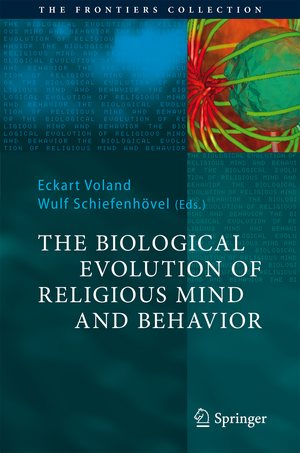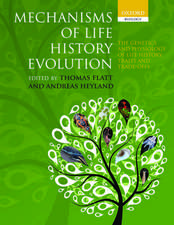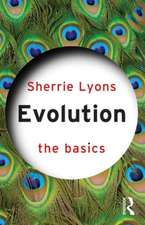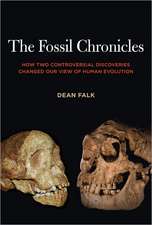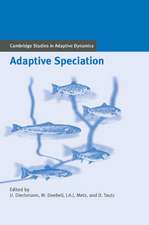The Biological Evolution of Religious Mind and Behavior: The Frontiers Collection
Editat de Eckart Voland, Wulf Schiefenhövelen Limba Engleză Hardback – 2 sep 2009
| Toate formatele și edițiile | Preț | Express |
|---|---|---|
| Paperback (1) | 389.31 lei 6-8 săpt. | |
| Springer Berlin, Heidelberg – 14 mar 2012 | 389.31 lei 6-8 săpt. | |
| Hardback (1) | 493.42 lei 3-5 săpt. | +28.35 lei 7-13 zile |
| Springer Berlin, Heidelberg – 2 sep 2009 | 493.42 lei 3-5 săpt. | +28.35 lei 7-13 zile |
Din seria The Frontiers Collection
- 20%
 Preț: 501.18 lei
Preț: 501.18 lei - 17%
 Preț: 366.23 lei
Preț: 366.23 lei - 20%
 Preț: 340.49 lei
Preț: 340.49 lei -
 Preț: 225.28 lei
Preț: 225.28 lei -
 Preț: 312.94 lei
Preț: 312.94 lei -
 Preț: 308.36 lei
Preț: 308.36 lei -
 Preț: 395.47 lei
Preț: 395.47 lei -
 Preț: 298.66 lei
Preț: 298.66 lei - 17%
 Preț: 525.36 lei
Preț: 525.36 lei -
 Preț: 215.30 lei
Preț: 215.30 lei -
 Preț: 381.15 lei
Preț: 381.15 lei -
 Preț: 351.90 lei
Preț: 351.90 lei -
 Preț: 323.05 lei
Preț: 323.05 lei -
 Preț: 396.40 lei
Preț: 396.40 lei -
 Preț: 297.61 lei
Preț: 297.61 lei -
 Preț: 225.86 lei
Preț: 225.86 lei -
 Preț: 283.50 lei
Preț: 283.50 lei -
 Preț: 270.71 lei
Preț: 270.71 lei -
 Preț: 346.61 lei
Preț: 346.61 lei -
 Preț: 271.81 lei
Preț: 271.81 lei - 15%
 Preț: 536.96 lei
Preț: 536.96 lei - 5%
 Preț: 383.93 lei
Preț: 383.93 lei -
 Preț: 500.84 lei
Preț: 500.84 lei -
 Preț: 484.69 lei
Preț: 484.69 lei - 15%
 Preț: 590.16 lei
Preț: 590.16 lei - 15%
 Preț: 543.98 lei
Preț: 543.98 lei - 15%
 Preț: 481.34 lei
Preț: 481.34 lei - 15%
 Preț: 640.24 lei
Preț: 640.24 lei -
 Preț: 401.79 lei
Preț: 401.79 lei -
 Preț: 388.34 lei
Preț: 388.34 lei -
 Preț: 390.63 lei
Preț: 390.63 lei - 15%
 Preț: 478.05 lei
Preț: 478.05 lei - 15%
 Preț: 475.15 lei
Preț: 475.15 lei - 15%
 Preț: 534.36 lei
Preț: 534.36 lei -
 Preț: 389.49 lei
Preț: 389.49 lei -
 Preț: 493.85 lei
Preț: 493.85 lei -
 Preț: 394.29 lei
Preț: 394.29 lei -
 Preț: 459.92 lei
Preț: 459.92 lei
Preț: 493.42 lei
Preț vechi: 594.48 lei
-17% Nou
Puncte Express: 740
Preț estimativ în valută:
94.41€ • 98.58$ • 78.14£
94.41€ • 98.58$ • 78.14£
Carte disponibilă
Livrare economică 14-28 martie
Livrare express 28 februarie-06 martie pentru 38.34 lei
Preluare comenzi: 021 569.72.76
Specificații
ISBN-13: 9783642001277
ISBN-10: 3642001270
Pagini: 352
Ilustrații: X, 305 p.
Dimensiuni: 155 x 235 x 20 mm
Greutate: 0.66 kg
Ediția:2009
Editura: Springer Berlin, Heidelberg
Colecția Springer
Seria The Frontiers Collection
Locul publicării:Berlin, Heidelberg, Germany
ISBN-10: 3642001270
Pagini: 352
Ilustrații: X, 305 p.
Dimensiuni: 155 x 235 x 20 mm
Greutate: 0.66 kg
Ediția:2009
Editura: Springer Berlin, Heidelberg
Colecția Springer
Seria The Frontiers Collection
Locul publicării:Berlin, Heidelberg, Germany
Public țintă
Professional/practitionerCuprins
Evaluating the Evolutionary Status of Religiosity and Religiousnessreligiousness .- Gods, Gains, and Genes.- How Some Major Components of Religion Could Have Evolved by Natural Selection?.- The Correlated History of Social Organization, Moralitymorality , and Religion.- Is There a Particular Role for Ideational Aspects of Religions in Human Behavioral Ecology?.- Talk and Tradition: Why the Least Interesting Components of Religion May Be the Most Evolutionarily Important.- The Reproductive Benefits of Religious Affiliation.- The African Interregnum: The “Where,” “When,” and “Why” of the Evolution of Religion.- Explaining the Inexplicable: Traditional and Syncretistic Religiosity in Melanesia.- Authoritarianism,Religiousness,religiousness and Conservatismconservatism : Is “Obedience to Authority” the Explanation for Their Clustering, Universality and Evolution?.- Cognitive Foundations in the Development of a Religious Mind.- Religious Belief and Neurocognitive Processes of the Self.- Neurologic Constraints on Evolutionary Theories of Religion.- On Shared Psychological Mechanisms of Religiousnessreligiousness and Delusional Beliefs.- Cognitive Foundations of Religiosity.- The Religious System as Adaptive: Cognitive Flexibility, Public Displays, and Acceptance.- The Evolution of Evolutionary Theories of Religion.- Evolutionary Perspectives on Religion – What They Can and What They Cannot Explain (Yet).
Notă biografică
Wulf Schiefenhövel is professor for medical psychology and ethnomedicine at the University of Munich and head of the human ethology group at the Max-Planck-Institute in Andechs, Germany. His main research interests are human ethology and evolutionary medicine, within which he focuses on sexuality and reproduction, human birth behavior, early infancy, language and cognitive concepts as well as the genetic and oral history of Melanesian populations
Eckart Voland is professor for philosophy of life sciences at the University of Giessen, Germany. His main research interests are human sociobiology and behavioral ecology. In particular he is interested in the biological evolution of social and reproductive strategies in humans. Moreover, in pursuing the project of naturalizing the human mind and its achievements, he works on the philosophical implications of evolutionary anthropology as reflected in evolutionary ethics and aesthetics.
Eckart Voland is professor for philosophy of life sciences at the University of Giessen, Germany. His main research interests are human sociobiology and behavioral ecology. In particular he is interested in the biological evolution of social and reproductive strategies in humans. Moreover, in pursuing the project of naturalizing the human mind and its achievements, he works on the philosophical implications of evolutionary anthropology as reflected in evolutionary ethics and aesthetics.
Textul de pe ultima copertă
In a Darwinian world, religious behavior - just like other behaviors - is likely to have undergone a process of natural selection in which it was rewarded in the evolutionary currency of reproductive success. This book aims to provide a better understanding of the social scenarios in which selection pressure led to religious practices becoming an evolved human trait, i.e. an adaptive answer to the conditions of living and surviving that prevailed among our prehistoric ancestors. This aim is pursued by a team of expert authors from a range of disciplines. Their contributions examine the relevant physiological, emotional, cognitive and social processes. The resulting understanding of the functional interplay of these processes gives valuable insights into the biological roots and benefits of religion.
Caracteristici
Presents new scientific evidence for controversial hypotheses about religiosity Combines modern psychology and psychiatry with evolutionary biology, archeology, anthropology to explain religious phenomena Survival value of religious behavior is analyzed Questions whether similar mental states underlie spirituality, mysticism and delusions Includes supplementary material: sn.pub/extras
